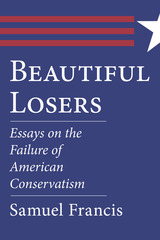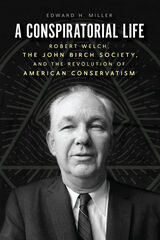3 books about American Conservatism

Beautiful Losers
Essays on the Failure of American Conservatism
Samuel Francis
University of Missouri Press, 1994
The 1992 presidential election campaign showed just how deep were the divisions within the Republican party. In Beautiful Losers, Samuel Francis argues that the victory of the Democratic party marks not only the end of the Reagan-Bush era, but the failure of the American conservatism.
[more]

A Conspiratorial Life
Robert Welch, the John Birch Society, and the Revolution of American Conservatism
Edward H. Miller
University of Chicago Press, 2021
The first full-scale biography of Robert Welch, who founded the John Birch Society and planted some of modern conservatism’s most insidious seeds.
Though you may not know his name, Robert Welch (1899-1985)—founder of the John Birch Society—is easily one of the most significant architects of our current political moment. In A Conspiratorial Life, the first full-scale biography of Welch, Edward H. Miller delves deep into the life of an overlooked figure whose ideas nevertheless reshaped the American right.
A child prodigy who entered college at age 12, Welch became an unlikely candy magnate, founding the company that created Sugar Daddies, Junior Mints, and other famed confections. In 1958, he funneled his wealth into establishing the organization that would define his legacy and change the face of American politics: the John Birch Society. Though the group’s paranoiac right-wing nativism was dismissed by conservative thinkers like William F. Buckley, its ideas gradually moved from the far-right fringe into the mainstream. By exploring the development of Welch’s political worldview, A Conspiratorial Life shows how the John Birch Society’s rabid libertarianism—and its highly effective grassroots networking—became a profound, yet often ignored or derided influence on the modern Republican Party. Miller convincingly connects the accusatory conservatism of the midcentury John Birch Society to the inflammatory rhetoric of the Tea Party, the Trump administration, Q, and more. As this book makes clear, whether or not you know his name or what he accomplished, it’s hard to deny that we’re living in Robert Welch’s America.
Though you may not know his name, Robert Welch (1899-1985)—founder of the John Birch Society—is easily one of the most significant architects of our current political moment. In A Conspiratorial Life, the first full-scale biography of Welch, Edward H. Miller delves deep into the life of an overlooked figure whose ideas nevertheless reshaped the American right.
A child prodigy who entered college at age 12, Welch became an unlikely candy magnate, founding the company that created Sugar Daddies, Junior Mints, and other famed confections. In 1958, he funneled his wealth into establishing the organization that would define his legacy and change the face of American politics: the John Birch Society. Though the group’s paranoiac right-wing nativism was dismissed by conservative thinkers like William F. Buckley, its ideas gradually moved from the far-right fringe into the mainstream. By exploring the development of Welch’s political worldview, A Conspiratorial Life shows how the John Birch Society’s rabid libertarianism—and its highly effective grassroots networking—became a profound, yet often ignored or derided influence on the modern Republican Party. Miller convincingly connects the accusatory conservatism of the midcentury John Birch Society to the inflammatory rhetoric of the Tea Party, the Trump administration, Q, and more. As this book makes clear, whether or not you know his name or what he accomplished, it’s hard to deny that we’re living in Robert Welch’s America.
[more]

The Southern Tradition
The Achievement and Limitations of an American Conservatism
Eugene Genovese
Harvard University Press, 1994
In recent years American conservatism has found a new voice, a new way of picking up the political pieces left in the wake of liberal policies. But what seems innovative, Eugene Genovese shows us, may in fact have very old roots. Tracing a certain strain of conservatism to its sources in a rich southern tradition, his book introduces a revealing perspective on the politics of our day. As much a work of political and moral philosophy as one of history, The Southern Tradition is based on the intellectual journey of one of the most influential historians of the late twentieth century.To appreciate the tradition of southern conservatism, Genovese tells us, we must first understand the relation of southern thought to politics. Toward this end, he presents a historical overview that identifies the tenets, sensibilities, and attitudes of the southern-conservative world view. With these conditions in mind, he considers such political and constitutional issues as state rights, concurrent majority, and the nature and locus of political power in a constitutional republic. Of special interest are the southern-conservative critiques of equality and democracy, and of the Leviathan state in its liberal, socialist, and fascist forms. Genovese examines these critiques in light of the specific concept of property that has been central to southern social and political thought.Not only does this book illuminate a political tradition grounded in the writings of John Randolph and John C. Calhoun, but it shows how this lineage has been augmented by powerful literary figures such as Allen Tate, Lewis Simpson, and Robert Penn Warren. Genovese here reconstitutes the historical canon, re-envisions the strengths and weaknesses of the conservative tradition, and broadens the spectrum of political debate for our time.
[more]
READERS
Browse our collection.
PUBLISHERS
See BiblioVault's publisher services.
STUDENT SERVICES
Files for college accessibility offices.
UChicago Accessibility Resources
home | accessibility | search | about | contact us
BiblioVault ® 2001 - 2024
The University of Chicago Press









